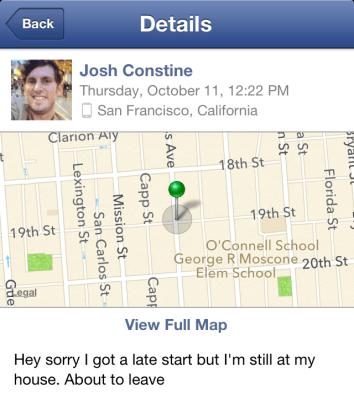Lying’s a lot harder than it used to be. Examples — Boss: “Where are you?” Employee: “On my way to the office.” Boss: “Show me.” ||| Mom: “Where are you?” Son: “At Jimmy’s house” Mom: “Show me.”
With geo-coded messages, you have to be where you say you are. Whether it’s a parent, employer, or spouse, anyone with a little power over you can demand you verify your location.
Sometimes you’re running late. Sometimes you aren’t where you’re supposed to be. You might be still in bed when your boss calls, or a kid could be biking through the night with their little hooligan buddies when they were supposed to be safe asleep at a friend’s house.
But until recently, the only thing someone had to go on was your word. They asked you over a voice call where you were, you told a little white lie, and then rushed to be where you said you were before they found out.
Now, someone could request a screenshot of your blue dot on your mobile map. Or that you send a geo-coded Facebook message that shows your current location. Hell, they could force you into a video call and request you to show the traffic you’re supposedly stuck in, or the house you’re supposed to be at.
Even if not demanded, this information is now getting passively transmitted, sometimes by default. A friend and I were exchanging geo-coded Facebook Messages the other day when he asked if we were still on for a meeting I was late to. For a split second I wanted to say I was already en route. Not true. Still lacing up my shoes.
So I told the truth, “Hey, sorry I got a late start but I’m still at my house. About to leave.”
If you don’t think it’s happening now, ask some savvy parents or people with suspicious spouses. It will only get more common if data-as-SMS protocols like iMessage gain geo-coding capabilities, which have plenty of consensual use cases.
Taken to the extreme, that might mean we can’t hide from Big Brother governments. But in our personal lives, the ability for others to technologically verify the truth will persuade us to tell it more often.
Like it or loathe it, this is a new social contract we’ll have to adapt to.
